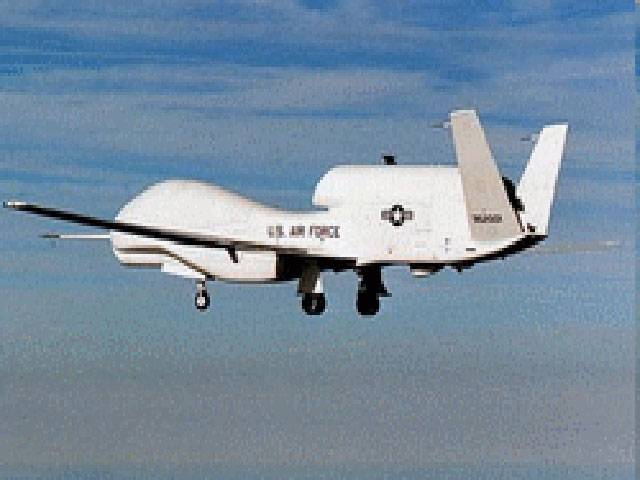MIRANSHAH - Two US drone strikes on Sunday killed at least 10 suspected militants in North Waziristan tribal region near the Afghan border, security officials said.
That made it three missile attacks in two days in Shawal district, in North Waziristan, after six suspected militants were also killed there on Saturday. North Waziristan is considered a bastion of Taliban and Al-Qaeda-linked insurgents.
In the first such attacks, a US drone strike targeting two militant vehicles early Sunday killed at least seven rebels in North Waziristan tribal region near the Afghan border, security officials said.
It was the second missile attack in 24 hours in Shawal district of North Waziristan. Three intelligence officials said the strike on Sunday came in the Mana area of NWA.
“US drones fired four missiles on two militant vehicles in the early hours of Sunday, killing seven militants,” said a security official seeking anonymity. The vehicles were completely destroyed.
He said there were up to five drones flying in the area at the time of the attack.
Another security official confirmed the attack and casualties but said the identities of those killed in the strike were not immediately known.
A local intelligence official in Miranshah, however, put the toll in the strike at six.
The officials said the area is dominated by Hafiz Gul Bahadur, a commander whose forces often target US troops in Afghanistan, but they did not know whether his men were targeted.
In a second drone strike on Sunday, US spy planes killed at least three suspected militants, security officials said.
“At least three militants were killed and two others wounded when a US drone fired two missiles at the site of this morning’s attack where militants were removing the wreckage of their two destroyed vehicles,” a security official said.
Another security official confirmed the attack and casualties.
Agencies add: The latest strikes came amid reports of a thaw in Pakistan’s generally deteriorating ties with the US following a visit to Washington by Pakistan’s spymaster, Lieutenant General Zaheerul Islam, earlier this month.
Islam’s talks with his CIA counterpart were said to have focused on drone strikes.
Attacks by unmanned American aircraft are deeply unpopular in Pakistan, which says they violate its sovereignty and fan anti-US sentiment, but US officials are said to believe the attacks are too important to give up.
The latest attacks were in the same region where a drone strike on June 4 killed 15 militants including senior Al-Qaeda figure Abu Yahya al-Libi.
In protest at the drone attacks, a Taliban and Pakistani warlord, Hafiz Gul Bahadur, has banned vaccinations in North and South Waziristan, putting 240,000 children in the region at risk.
He has condemned the immunisation campaign as a cover for espionage.
In May, a doctor was jailed for 33 years after helping the CIA find Osama bin Laden using a hepatitis vaccination programme as cover.
Washington considers Pakistan’s semi-autonomous northwestern tribal belt the main hub of Taliban and Al-Qaeda militants plotting attacks on the West and in Afghanistan.
The Al-Qaeda-linked Haqqani network in North Waziristan, blamed for some of the deadliest attacks in Afghanistan, is one of the thorniest issues between Islamabad and Washington.
Washington has long demanded that Pakistan take action against the Haqqanis, whom the United States accused of attacking the US embassy in Kabul last September and acting like a “veritable arm” of Pakistani intelligence.
Pakistan has in turn demanded that Afghan and US forces do more to stop Pakistani Taliban crossing the Afghan border to relaunch attacks on its forces.
There has been a dramatic increase in US drone strikes in Pakistan since May, when a NATO summit in Chicago could not strike a deal to end a six-month blockade on convoys transporting supplies to coalition forces in Afghanistan.
On July 3 however, Islamabad agreed to end the blockade after the United States apologised for the deaths of 24 Pakistani soldiers in botched air strikes last November.
Thursday, April 18, 2024
10 killed in twin NWA drone strikes

Enemies of Pakistan are unable to digest investment in the country: Ataullah Tarar
1:29 PM | April 18, 2024
IHC restores Bushra Bibi's appeal for shifting to Adiala Jail from Bani Gala
1:24 PM | April 18, 2024
ITP cracks down on traffic violations
April 18, 2024
Illegal housing societies in Rawalpindi to face crackdown
April 18, 2024
Hepatitis Challenge
April 18, 2024
IMF Predictions
April 18, 2024
Wheat War
April 18, 2024
Rail Revival
April 17, 2024
Addressing Climate Change
April 17, 2024
Justice denied
April 18, 2024
AI dilemmas unveiled
April 18, 2024
Tax tangle
April 18, 2024
Workforce inequality
April 17, 2024
New partnerships
April 17, 2024
ePaper - Nawaiwaqt
Advertisement
Nawaiwaqt Group | Copyright © 2024





